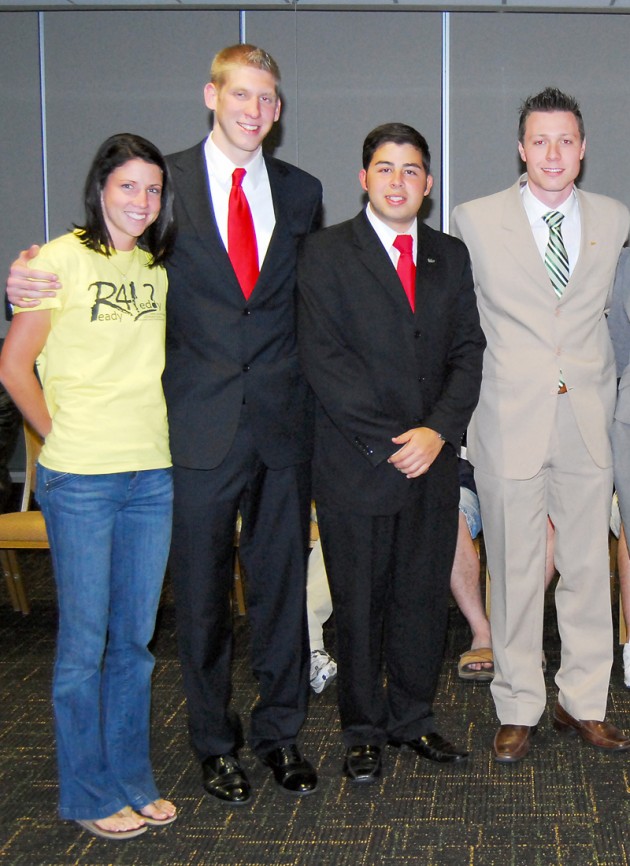Student body election results prompt runoff

Student Government officials hoped for 10,000 educated votes in the student body election poll, but only 3,236 students voted.
Though the number of voters dropped, Supervisor of Elections Michael van Hoek said he was happy some of the “nonsense” from years past — including candidates giving pizza to voters or bringing laptops to parties where students were drinking — was eliminated. Last year, 5,165 students voted.
“We were able to get nearly 3,300 (voters) under actual, real circumstances,” van Hoek said. “From that angle, it was a success.”
SG marketing director Nathan Davison said that despite a complicated election week, there was much less corruption this year — but there were other unforeseen challenges, such as the issue with Blackboard.
“I would have liked to have seen more presence from candidates on campus,” he said.
This week, students will get a chance to vote again in a runoff election between candidates Christopher Leddy and running mate Kayla Richmond, and Juan Soltero and running mate Bruno Portigliatti.
Soltero and Portigliatti led in the original race with 43 percent of the vote, and Leddy and Richmond trailed with 25 percent. There will be a runoff because no candidate received more than 50 percent of the votes.
Candidates Christopher Cano and Ralph Reid will not move on to the final election.
Students can vote in the runoff election Tuesday and Wednesday from 9 a.m. to 7 p.m.
Before the voting results were announced, there were mixed feelings in the Oak Room of the Marshall Student Center (MSC).
Portigliatti said that if a runoff were to occur, it would be between the Soltero and Leddy tickets.
“It would be historical if it doesn’t go into a runoff,” he said. “Anytime you have four tickets, it is nearly impossible not to go into a runoff election.”
Soltero said he felt good but anxious, while Leddy said he was nervous but excited.
“A lot of people said they voted,” Leddy said. “Some people said they voted for me.”
Cano said he just wanted the winning candidates to have the student body behind them.
Roup said she felt some voting issues should have been resolved beforehand, such as the IP address problem that made voting more difficult for students living in off-campus apartments.
Aside from those issues, Roup felt the voting went well and said she was “trying to be optimistic” about the results.
Richmond said she was ecstatic about she and Leddy’s accomplishment.
Leddy said that in the upcoming campaign for the runoff, the two would focus on making students more aware of the elections and getting them to vote for a second time.
Soltero said the significant percentage felt good.
“But the election is still open — we’ve got to stay focused on the message. We’re going to keep fighting strong,” he said.
Both candidates said they have planned their first action in office.
Leddy said his first action would be to save the $1,000 he pledged for a scholarship fund and immediately start lobbying and talking to legislators.
Soltero said he wants to get his main cabinet members appointed as early as possible so they can gain the knowledge they need from this year’s members and transition smoothly.
Cano said he was not bothered by the loss but was happy students voted.
“Honestly, we ran the cleanest campaign,” he said. “We’re proud of the way we carried ourselves.”
Reid’s running mate Robin Roup said she was “kind of surprised” by the results. Reid and Roup probably won’t endorse another ticket during the runoff election, she said.
Reid did not attend the Election Night Announcement Social because he was in Tallahassee with the Political Honor Society, Roup said.
Aside from presidential candidates, students also voted on several non-binding referendums. Though the votes will not directly effect any changes, they were meant to gauge student interest in the proposals.
A majority of students chose to allocate Capital Improvement Trust Fund money for a combination facility, which would include Campus Recreation Center expansion and a nutritional dining facility in the Sun Dome. Voters’ most favored type of dining facility was a “grab and go” style, like the MSC.
Students also chose to allot the Tech Fee money for classroom capture technology, which would provide video footage of class lectures that students could access online.
The Green Fee initiative was approved by 58 percent of voters.
However, before results were announced, Student Environmental Association (SEA) president Lyndsey Scofield said she was concerned about how a change in the language of the Green Fee referendum might affect voters’ decisions.
Scofield said the wording on the ballot asked if students would support a green fee for “green projects.”
“We actually had worded it as ‘renewable energy and energy efficiency projects on campus,'” Scofield said. “(The ballot) didn’t really say much about what a green project is or what it would actually be spent for. We were kind of disappointed in that.”
Soltero, as the SG Senate president, said the language issue has not yet been addressed in SG and that he will speak with Scofield and the Election Rules Commission about it.
He said the main goal of the referendum had not changed, so it was unclear whether it would require a re-vote.
Scofield said USF’s support of the Green Fee has made the case for the Green Fee legislation at the state level much stronger. She said SEA hopes to lobby state representatives to pass the Green Fee legislation during this session.







